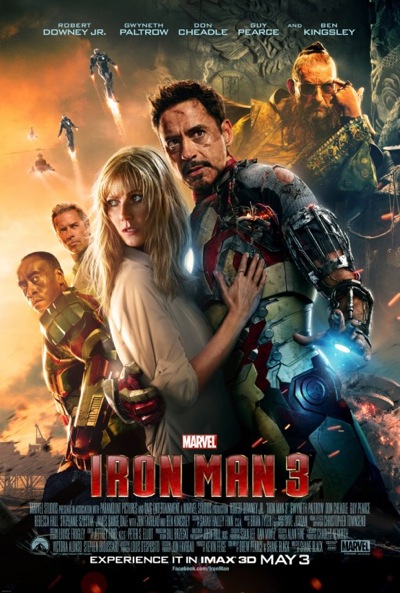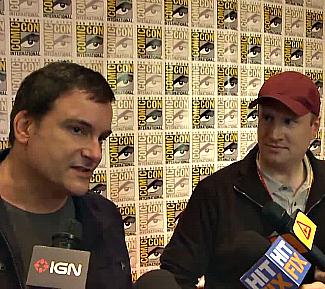
When Shane Black was brought on to direct IRON MAN 3, there was much rejoicing among film geeks. The idea of not only turning over a $1 billion-plus franchise to the spec screenwriting maestro who brought us LETHAL WEAPON, THE LAST BOY SCOUT and THE LONG KISS GOODNIGHT, but also reuniting the director and star (Robert Downey Jr.) of 2005's brilliant KISS KISS, BANG BANG seemed too good to be true. And maybe it was. Indeed, once the high wore off, and the reality of the situation set in, we found ourselves hoping that just a smidgen of Black's hard-boiled wiseguy sensibility would find its way into this massive, four-quadrant, sold-to-the-world summer tentpole. Surely, this would be a Marvel Studios movie spiked with just a dash of Shane Black.
From Robert Downey Jr.s scatterbrained opening narration to an out-of-left-field twist in the middle of the film to the emotionally resonant action of the final set piece, Black's voice never wavers. Though his colorfully profane dialogue has been somewhat sanitized for the kiddies (with one huge exception), Black manages to bring his crackerjack sense of fun and invention to a genre that often feels like by-committee filmmaking. I don't know how harmonious things were behind the scenes, and I don't care: all I know is that IRON MAN 3 is the most satisfying Marvel Studios movie yet, and this is because it is a Shane Black movie.
Last week, I sat down for a brief interview with Black and Marvel Studios honcho Kevin Feige, both of whom were in terrific spirits despite being at the ass end of a three-day press junket. I had two totally different sets of questions for both, but somehow the conversation flowed pretty smoothly for ten minutes or so. There are no major spoilers, and just a little bit of speculation as to how the events of IRON MAN 3 might pay off to some degree in THE AVENGERS 2. For hardcore Black fans, you might be interested to read that one of his earliest screenplays, SHADOW COMPANY, still has a shot at getting made.

Mr. Beaks: This is kind of your Bond film.
Shane Black: Doesn't Guy Pearce feel like a Bond villain in this?
Kevin Feige: That's what Shane talked about from day one.
Black: Not necessarily replicating any particular Bond, but just having an adventure that's a caper where the pieces are revealed in stages, and he's sort of on his way investigating, getting in deeper and deeper, until the last piece falls into place, and they have the final conflict. Putting that into the mix was a lot of fun. It seemed to be the way to go.
Beaks: How does that work for you, Kevin, in terms of having to integrate everything you need out of an IRON MAN film? Applying a different aesthetic, or at least part of it, to an established formula?
Feige: We hired Shane Black because we wanted a new aesthetic. This is our first part three, and it was very important to us that it stand apart; that after THE AVENGERS, it sort of reminds the audience that these characters can stand alone, and hopefully be as interesting as they are when they're standing together. Also, there are some good part threes, and there are more bad part threes. If nothing else, we wanted this to be a unique part three, and I think Shane can't help but bring a skewed sense to everything, and a unique point of view. We knew there would be new suits, we knew there would be new tech, we knew there would be all of that candy. We knew we had Robert. But taking Tony to different places, stripping him of all his toys...
Black: A little bit rough, a little bit loose, a little bit edgy, and, ultimately, we knew we had to be funny. We knew we could be dark, but we had to be funny. Fortunately, we have Robert Downey Jr., who always gives you your weight in funny.
Beaks: This is the first Marvel film where I engaged the material on a thematic level. There's a strong thematic throughline. I'm asking questions like, "Who's in the suit?", "Why are they in the suit?", "What does it mean for them to be in the suit?" That's exciting. Were these things you considered in the development of the film?
Black: Here's the deal... and it's gratifying that you would even say so, because a lot of thought goes into that. And then you think, "Well, it's going to play as this adventure, this action-filled ride, and if they're really looking, maybe they'll get the other parts." The fact that you're saying that means that the stuff that we thought about isn't entirely being lost or wasted on an audience, and that would be high cotton if that's the case.
Beaks: Another thing I like about this film is that the suit is more interesting when it's not functioning properly. And then the less of the suit you have, the more exciting it can be. The scene in which Tony is fighting off henchmen with two pieces of the armor is just fantastic. Where did that come from?
Black: Just changing it up. More last-ditch, desperate, think-on-your-feet Tony, and less fly-around-exalting-in-being-Iron-Man Tony. Less arrogance, more vulnerability and fear.
Feige: Going back to the first film, it was always important to Favreau and I that it feel like a vehicle, that it didn't feel like a costume. So it had all the flaps, and it had to obey the laws of physics, the notion that, if everything doesn't go right, he could fall out of the sky at any moment. It was also important to us in the first film that it be incredibly heavy and that it take him a while to get it on and get it off. That, in those movies, was how we saw the reality of it. This is now the fourth one, and now you want to mix it up; you want to evolve the tech the way he does in the comics. The notion of the prehensile suit, the Mark 42, that comes to him in pieces, was really cool and allowed for any number of new action sequences. But it was important that, with this relatively fantastical tech, that each piece can rocket at him. That's very different from the first movie. We said, "Okay, we're willing to take that step, but it has to barely work. It has to have so many limitations to it for the audience to even buy it." As you see in the movie, Jarvis reminds him midway through the mansion attack, "It's a prototype, sir!" That was a lot of fun.
Beaks: Wounded veterans being used as weapons. Shane, did you draw at all on SHADOW COMPANY for IRON MAN 3?
Black: I didn't really think about it so much, no. But it's interesting. I actually wouldn't have drawn on that because we want to get that made at some point.
Beaks: Still?
Black: Yeah. It's now a period piece, which is strange. I would set it in 1974, and just do it as an EVIL DEAD movie. "This happened long ago on this night. These are declassified [files]. We recently discovered this story."
Feige: That sounds awesome.
Beaks: I'd love to see that. Kevin, it feels like Marvel is figuring out the art of the setup, how to use the standalone films to build up to an AVENGERS movie. What I love about IRON MAN 3 is that it is a true standalone movie. You don't have any extraneous plates spinning.
Feige: The notion always was, even though we had to make this movie before we even started filming THE AVENGERS, we've had a lot of success at Marvel Studios just going, "This is what we want to do, and this is what we hope will happen, so let's just do it!" (Laughs) I think much of Hollywood are Monday morning quarterbacks, and maybe we'll become that some day. But right now, we're not, and we can just keep going ahead. So what we were talking about with Shane was, "We're going to have this movie THE AVENGERS, we're hoping it's going to work, and if it works, it's going to work because people thought it was cool that we were building up to this thing. We want to keep making movies after THE AVENGERS, and if that's going to work, it's only going to work if they can stand alone again. I'm not sure Shane would've been interested if we'd told him he had to have all the other characters showing up every other scene. Would you?
Black: It would've been a significant redo.
Feige: And the other thing is, when you see THE AVENGERS 2, you'll see there was stuff that is leading up to it. It's just not as overt, because, frankly, it doesn't need to be as overt. Audiences already get it, they already understand. Actually, it's going to be the opposite problem. Some people will ask, "How come Nick Fury didn't show up? How come he didn't call Captain America to help him?" And there are answers for that, too.
Beaks: Shane, how are you as a storyteller with incorporating elements that will payoff in someone else's movie?
Black: They don't tell me. If they work in this movie, I don't care how they're used afterwards. I don't care if it was pre-planned or they thought of it on the fly. If it works for this movie, I'm perfectly thrilled.
Beaks: Getting back to the Bond film comparison, Bond films had a random rotation of directors. They'd sort of come and go. But there were the good Bond directors. As far as IRON MAN goes, I feel like you fit here. (Black laughs) So is this a door that's going to stay open?
Black: I will probably direct a Bond film at some point, yes. (Feige laughs) Here's the problem: Marvel thinks too far ahead. They've hired their directors for the next four years. What am I going to do? Wait around for someone to ask me to dance? No, I'm going to go dance. But I've had a great time here. These guys are really bright and really fun. I'm a fan of their movies. I'm going to go see GUARDIANS OF THE GALAXY and THOR as a fanboy, and then maybe, two years from now, when they get around to making more movies, if they're still asking, maybe. But in the meantime, I'm just going to sit back and see what they have planned, because they have a pretty full dance card.
Beaks: And, as you said before. one deterrent is that you can't drop f-bombs in these movies.
Black: Oh, I can do whatever I want.
Goddamn right he can.
IRON MAN 3 hits U.S. theaters on May 3rd.
Faithfully submitted,
Mr. Beaks
